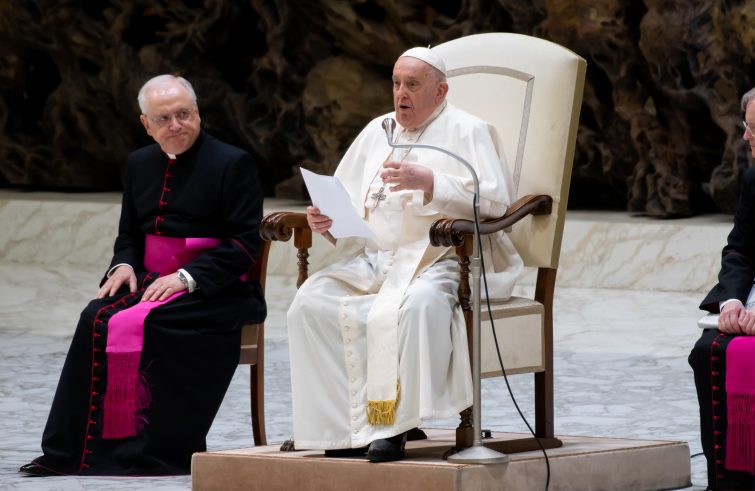
“I am still not well and my voice is not good.” With these words Pope Francis opened Wednesday’s audience in the Paul VI Hall, having cancelled his trip to the COP28 in Dubai last night on the advice of his doctors. Msgr. Filippo Ciampanelli, a dignitary of the Secretariat of State, then read the catechesis and delivered the greetings in the various languages. At the end of the audience, after a performance by circus artists participating in the Festival of Italian Circus Talents, Francis renewed his call for peace in the Holy Land. Referring to his state of health, the Pope used the Spanish term “gripe”, which means flu. He had mentioned a “lung infection” during last Sunday’s Angelus from Casa Santa Marta.
“Please, continue to pray for the serious situation in the Holy Land”, was the Pope’s appeal who took the floor to renew his appeal: “Please, please, peace!” “I hope that the ongoing ceasefire in Gaza will continue, that all hostages will be released, and that necessary humanitarian aid will still be allowed in”,
Francis said. He added: “I have been in contact with the parish in Gaza: there is no water, there is no bread, people are suffering. The simple people, the suffering population: those who wage war are not suffering. We are asking for peace”. ” Speaking of peace, let us not forget the dear Ukrainian people, who are suffering so much,” the Pope remarked: “War is always a defeat, everybody loses. Not everyone, there is a group that profits a lot:
The arms dealers, they profit greatly from the death of other people”.
Earlier, clowns, acrobats and circus jugglers performed for Francis, who applauded them several times before posing for a group photo. “I would like to thank these young girls and boys of the circus for this moment of joy,” he said in unscripted remarks: “The circus makes us enjoy a specific aspect of the human soul, which is gratuitous joy, the simple joy that comes with the mystique of play. I am extremely grateful to these boys and girls who make us smile, while at the same time demonstrating their hard training, because to do what they do requires a very high level of training”.
“We find ourselves in the first civilization in history that globally seeks to organize a human society without the presence of God, concentrated in huge cities that remain horizontal despite their vertiginous skyscrapers”,
states the Pope’s reflection contained in the catechesis for the audience read out by Monsignor Campanelli. “Even today, cohesion, instead of fraternity and peace, is often based on ambition, nationalism, homologation, and techno-economic structures that inculcate the persuasion that God is insignificant and useless: not so much because one seeks more knowledge, but above all for the sake of more power”, is the comment referred to the story of the Tower of Babel: “It is a temptation that pervades the great challenges of today’s culture.”
“We must not fear dialogue: on the contrary, it is precisely confrontation and criticism that help us to preserve theology from being transformed into ideology”,
the exhortation for the present time: “It is necessary to stand at the crossroads of today. Leaving them would impoverish the Gospel and reduce the Church to a sect. Frequenting them, on the other hand, helps us Christians to understand in a renewed way the reasons for our hope, to extract and share from the treasure of faith ‘what is new and what is old’”. For Francis, “Jesus can be proclaimed only by inhabiting the culture of one’s own time. There is therefore no need to contrast today with alternative visions from the past. Nor is it sufficient to simply reiterate acquired religious convictions that, however true, become abstract with the passage of time.”
“A truth does not become more credible because one raises one’s voice in speaking it, but because it is witnessed with one’s life”,
is the Pope’s thesis, for whom “apostolic zeal is never a simple repetition of an acquired style, but testimony that the Gospel is alive today here for us.” “Aware of this, let us therefore look at our age and our culture as a gift.” The Pope’s guidance: “They are ours, and evangelizing them does not mean judging them from afar, nor is it standing on a balcony and shouting out Jesus’ name, but rather going down onto the streets, going to the places where one lives, frequenting the spaces where one suffers, works, studies and reflects, inhabiting the crossroads where human beings share what has meaning for their lives. It means being, as a Church, a leaven for dialogue, encounter, unity. After all, our own formulations of faith are the fruit of dialogue and encounter among cultures, communities and various situations.” “More than wanting to convert the world of today, we need to convert pastoral care so that it better incarnates the Gospel in today”, Francis concluded: “Let us make Jesus’ desire our own: to help fellow travellers not to lose the desire for God, to open their hearts to Him and find the only One who, today and always, gives peace and joy to humanity.”












